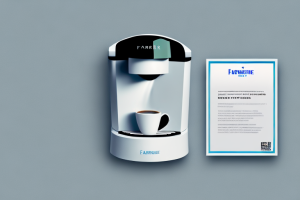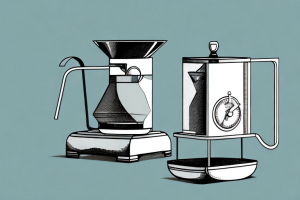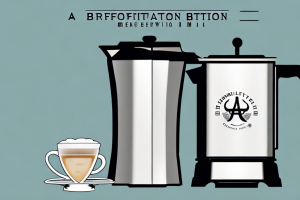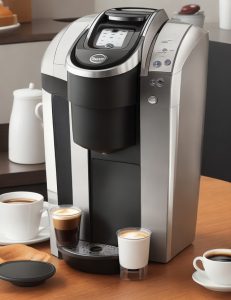Coffee Maker Watts

A coffee maker with a wattage meter attached to it
Coffee makers are an essential part of our daily lives. They provide us with the much-needed caffeine boost to start our day and keep us going throughout the day. However, coffee makers come in different types, sizes, and wattages, and understanding these factors is crucial in choosing the right one for your needs. In this article, we will explore the importance of wattage in coffee makers and everything you need to know about choosing the right wattage for your coffee maker.
Understanding Watts in Coffee Makers
Before we dive into the world of coffee maker wattage, it’s essential to understand what watts are. Wattage is the amount of power a device consumes or produces, and it’s usually indicated on the product label or manual. In simple terms, the higher the wattage, the more power the coffee maker consumes. This means that high wattage coffee makers consume more electricity than low-wattage ones.
When it comes to coffee makers, wattage can affect the brewing time and temperature. High wattage coffee makers can heat up the water faster, resulting in a quicker brewing time. However, this can also lead to a higher temperature, which can affect the taste of the coffee. On the other hand, low wattage coffee makers may take longer to heat up the water, resulting in a slower brewing time, but can also produce a better-tasting coffee due to the lower temperature.
It’s important to note that wattage is not the only factor to consider when choosing a coffee maker. Other factors such as the type of coffee maker, brewing method, and brand can also affect the quality of the coffee. Ultimately, it’s up to the individual to decide which coffee maker suits their needs and preferences best.
How Many Watts Does Your Coffee Maker Need?
The wattage of your coffee maker depends on various factors such as the size of the coffee maker, the type of coffee maker, and the number of cups it makes. Generally, the average wattage of a standard drip coffee maker is 600-900 watts. However, larger coffee makers with more cups typically have higher wattage requirements. For example, coffee makers that brew 12 cups of coffee often require a wattage of up to 1200 watts.
It’s important to note that the wattage of your coffee maker can also affect your electricity bill. Higher wattage coffee makers will consume more energy and therefore cost more to operate. If you’re looking to save on your electricity bill, consider purchasing a coffee maker with a lower wattage or using a smaller coffee maker if you don’t need to brew a large amount of coffee.
The Importance of Wattage in Coffee Makers
The wattage of your coffee maker affects the brewing time and the temperature of the coffee. High wattage coffee makers typically heat up and brew coffee faster than low-wattage ones. This means that a high-wattage coffee maker can be an excellent choice if you need your coffee ready quickly. Additionally, high wattage can ensure that your coffee stays hot for longer, making it ideal for those who prefer to take their time drinking their coffee.
However, it’s important to note that high wattage coffee makers may consume more electricity and cost more to operate than low wattage ones. If you’re looking to save on your energy bill, a low wattage coffee maker may be a better option. Additionally, some coffee enthusiasts argue that low wattage coffee makers can produce a better-tasting coffee due to the slower brewing process, which allows for more flavor extraction from the coffee grounds.
The Pros and Cons of High Wattage Coffee Makers
On the one hand, high-wattage coffee makers offer quick and efficient brewing, which is essential for those who don’t have too much time in the morning or for those who need to make coffee in large quantities. On the other hand, high-wattage coffee makers consume more energy, which means they can be more expensive to operate. Furthermore, high wattage can be detrimental to the coffee’s flavor and quality, as it can lead to over-extraction and burnt coffee.
However, some coffee enthusiasts argue that high-wattage coffee makers can actually enhance the flavor of certain types of coffee beans. This is because high wattage can extract more oils and flavors from the beans, resulting in a richer and more robust taste. Additionally, some high-wattage coffee makers come with advanced features such as temperature control and pre-infusion, which can further improve the quality of the coffee. Ultimately, the decision to use a high-wattage coffee maker depends on personal preference and priorities, whether it be speed and convenience or flavor and quality.
Lower Wattage Coffee Makers: Are They Worth the Savings?
Low-wattage coffee makers are ideal for those on a budget or for those who want to save energy. Lower wattage coffee makers often come with lower price tags and can be an excellent choice for those who want to enjoy good coffee without spending too much. Additionally, low-wattage coffee makers usually have longer brew times, which can enhance the flavor and aroma of your coffee.
However, it is important to note that lower wattage coffee makers may not be suitable for those who need their coffee quickly. The longer brew times can be inconvenient for those who are always on the go and need their coffee in a hurry. Additionally, some low-wattage coffee makers may not have the same features as higher wattage models, such as programmable settings or automatic shut-off.
On the other hand, if you are someone who enjoys the process of making coffee and wants to take the time to savor the experience, a low-wattage coffee maker may be the perfect choice for you. With a longer brew time, you can enjoy the aroma and flavor of your coffee as it slowly drips into your cup, creating a more relaxing and enjoyable coffee-drinking experience.
Choosing the Right Wattage for Your Coffee Maker
The right wattage for your coffee maker depends on your needs and preferences. If you want coffee faster and hotter, a high-wattage coffee maker may be the best option for you. However, it’s important to consider the energy consumption and the potential impact on the coffee’s flavor. If you’re on a budget or want to save energy, a low-wattage coffee maker may be the best option for you.
Another factor to consider when choosing the right wattage for your coffee maker is the size of your household. If you live alone or with one other person, a lower wattage coffee maker may be sufficient for your needs. However, if you have a larger household or frequently entertain guests, a higher wattage coffee maker may be necessary to keep up with demand. It’s important to find a balance between wattage and capacity to ensure that you’re getting the most out of your coffee maker.
How to Calculate the Wattage of Your Coffee Maker
Calculating the wattage of your coffee maker is relatively easy. You can check the product label or manual for the wattage of your coffee maker. Alternatively, you can calculate the wattage of your coffee maker by dividing the total power rating by the voltage. For example, a 1000-watt coffee maker with a voltage of 120 volts will consume around 8.3 amps.
It is important to know the wattage of your coffee maker so that you can determine how much electricity it consumes. This information can help you estimate your energy costs and make adjustments to your energy usage. Additionally, knowing the wattage of your coffee maker can help you determine if it is compatible with certain electrical outlets or circuits in your home.
Do Espresso Machines Have Higher Wattages Than Regular Coffee Makers?
Yes, espresso machines typically have higher wattages than regular coffee makers. This is because espresso machines require higher temperatures and pressure to brew espresso shots. The average wattage of an espresso machine ranges from 1000-1500 watts, depending on the machine’s size and features.
It’s important to note that while espresso machines have higher wattages, they also have shorter brewing times compared to regular coffee makers. This means that they consume less energy overall, as they only need to be turned on for a short period of time to brew a shot of espresso. Additionally, some newer models of espresso machines are designed to be more energy-efficient, using less wattage without compromising the quality of the espresso.
The Relationship Between Wattage and Brew Time in Coffee Makers
The wattage of your coffee maker directly affects the brewing time of your coffee. Higher wattage coffee makers usually brew coffee faster than lower wattage coffee makers. However, faster brew times can negatively impact the coffee’s quality and flavor. Lower wattage coffee makers usually have longer brew times, which can result in better extraction and a more robust coffee flavor.
It’s important to note that the type of coffee you use can also affect the brewing time and flavor. For example, darker roasts typically require longer brew times than lighter roasts. Additionally, the grind size of your coffee can impact the brewing time and flavor. Finer grinds usually require shorter brew times, while coarser grinds require longer brew times. Experimenting with different coffee types and grind sizes can help you find the perfect balance between brewing time and flavor for your coffee maker.
Energy Efficiency and Coffee Maker Watts: What You Need to Know
Coffee makers can consume a significant amount of energy, making them one of the most energy-intensive appliances in our homes. To save energy and reduce electricity bills, it’s essential to choose an energy-efficient coffee maker. Look for coffee makers with energy star ratings or eco-friendly features. Additionally, it’s crucial to turn off your coffee maker when not in use to save energy and reduce electricity costs.
Can High Wattage Coffee Makers Affect Your Electricity Bill?
High wattage coffee makers can significantly impact your electricity bill. A high-wattage coffee maker consumes more power than a low-wattage one, which can lead to high electricity bills. It’s essential to choose an energy-efficient coffee maker or switch to a low-wattage coffee maker if you want to save energy and reduce your electricity bill.
Tips for Reducing Energy Consumption with Your Coffee Maker
There are various ways to reduce energy consumption with your coffee maker. Firstly, choose an energy-efficient coffee maker or switch to a low-wattage model. Secondly, turn off your coffee maker when not in use, as leaving it on can consume unnecessary energy. Additionally, avoid using coffee makers that have additional features such as warming plates, which can significantly increase energy consumption.
Are Low-Wattage Coffee Makers Better for the Environment?
Yes, low-wattage coffee makers are better for the environment as they consume less energy and produce fewer greenhouse gas emissions. Choosing an energy-efficient or low-wattage coffee maker can significantly reduce your carbon footprint and help protect the environment.
Comparing the Wattages of Popular Coffee Maker Brands
Popular coffee maker brands such as Mr. Coffee, Keurig, and Ninja all offer various coffee makers with different wattages. For instance, Mr. Coffee’s 12-cup coffee maker has a wattage of 900 watts, while Keurig’s K-Elite single-serve coffee maker has a wattage of 1470 watts. When choosing a coffee maker, it’s essential to compare the wattages of different brands and models to choose the one that best suits your needs.
Conclusion
The wattage of your coffee maker plays a significant role in how quickly your coffee is brewed, the temperature of your coffee, and the energy consumption. When choosing a coffee maker, it’s essential to consider your needs, preferences, and budget to choose the right wattage. Remember, choosing an energy-efficient coffee maker not only saves energy but also reduces your electricity bills and helps protect the environment.



